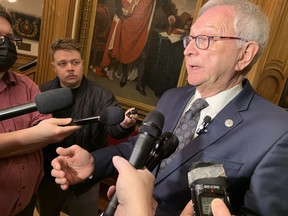Premier says he wants to overhaul property tax system
In the face of complaints from homeowners, Blaine Higgs says he'd like to reform the system this year

Article content
Facing an outcry over high property taxes, Premier Blaine Higgs says provincial assessment services need an overhaul, and is musing that it could be farmed out to a private company or a new, standalone Crown corporation.
Speaking to reporters Thursday at the legislature, the Progressive Conservative premier said property tax assessments had long plagued New Brunswick governments, both Liberal and Tory.
This year, close to 10,000 property owners have launched appeals of their assessments, the highest number since a 2017 property tax scandal when Service New Brunswick pushed through batches of higher assessments without doing proper evaluations.
“Here we have a case where assessments are up because the population’s up and the demand’s up, so the market has improved,” Higgs said. “People aren’t really questioning the value of their homes. They’re questioning the taxes that are related to that value.”
This year the provincial government added an information sheet to property tax bills encouraging homeowners to contact their municipal government if they are unhappy with their tax rate.
People aren’t really questioning the value of their homes. They’re questioning the taxes that are related to that value.
Blaine Higgs
The province comes up with the property assessments and collects the taxes, but then transfers the taxes on people’s principal home to municipalities. It only collects a portion of property taxes for its own coffers from apartments, cottages, secondary homes and commercial properties.
Nine out of every 10 property owners saw their property assessments go up this year.
At the high end, four out of 10 properties saw greater than a 10 per cent increase in their assessed values. Even with the province’s spike protection mechanism, many bills will go up 10 per cent, or hundreds of dollars.
Higgs said there was a good reason the province included the information sheet.
“The general public felt it was our bill because it has the Government of New Brunswick’s name on it. We do the assessments, that’s fair. But we don’t set the tax rate.”
Nonetheless, he expressed sympathy for municipalities struggling to make ends meet following local government reforms that his government imposed last year.
“I know the municipalities have increased costs, the same as we do. Our costs of operating government have gone up dramatically. So, I know they’re faced with the same thing. But let’s all look at where the opportunity can and cannot be and find out other sources of revenue.”
A recent independent study by two Université de Moncton economists recommended the province open new sources of revenue for struggling municipalities. Following provincial reforms that forced the amalgamation of many communities last year, it warned as many as 29 of the province’s 89 local entities were at risk of financial failure.
“Through this next year, it’s more important than ever that we have these financial discussions with the change in municipal reform, and all the discussions with municipalities and how they’re funded and make sure they have the funds they need to go forward and grow,” Higgs said.
Municipal leaders in the province have long complained they need more sources of revenue to keep their communities running.
“We need to figure that out,” Higgs admitted. “What should be different? Because I just think this is the year to really, finally put this thing to rest.”
Although the province has committed to putting in fiscal reform for municipalities by January, it will be after the provincial election, which must be held by Oct. 21.
Higgs said he’d analyzed charts that show property tax rates are much higher in New Brunswick than in neighbouring Prince Edward Island and Nova Scotia, and he wants to get to the bottom of it.
“This is the time that all the facts are on the table and we find the right financing model going forward, and including if we should be in the assessment business. Because the other provinces are totally set up differently.”
Deputy Liberal Leader René Legacy, who had just delivered a speech in response to the Tory budget introduced on Tuesday, said he was pleased to hear the premier acknowledge that something had to be done to fix assessments and property taxes.
While we’re talking about this, municipalities are really suffering.
René Legacy
In his speech, Legacy criticized the Tory government for still charging a rate of $19.40 for every $100,000 of assessed property just to do the assessment work. With property values going up, some people were seeing that charge rise dramatically. Legacy called for a flat rate that would charge everyone the same. Higgs acknowledged the rate should be part of any review.
“We’ve been calling for this review,” Legacy said. “There’s also the fact that while we’re talking about this, municipalities are really suffering. And we’re still sitting with a government with a large surplus that can probably offer some temporary relief at least.”
Green party Leader David Coon said fiscal reform for municipalities was long overdue and communities couldn’t wait much longer.
Everyone needs to understand why it’s gone wrong, why it’s inconsistent and often appears inequitable and unfair before we start building a new system.
David Coon
But he argued that before any major changes are made to property assessments, a public inquiry should be held.
“Everyone needs to understand why it’s gone wrong, why it’s inconsistent and often appears inequitable and unfair before we start building a new system,” he said. “What I hear most often from people is the system is unfair. So many places have property tax assessments that are dramatically different even though they have comparable homes. And then we need to look at how fairness could exist across property types from residential all the way to industrial. We haven’t got that.”












Postmedia is committed to maintaining a lively but civil forum for discussion. Please keep comments relevant and respectful. Comments may take up to an hour to appear on the site. You will receive an email if there is a reply to your comment, an update to a thread you follow or if a user you follow comments. Visit our Community Guidelines for more information.